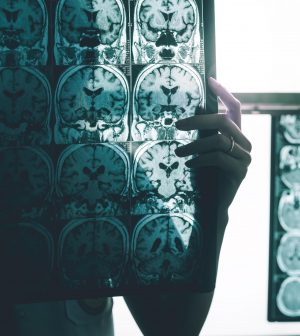- Could Your Grocery Store Meat Be Causing Recurring UTIs?
- Are You Making This Expensive Thermostat Error This Winter?
- Recognizing the Signs of Hypothyroidism
- 10 Strategies to Overcome Insomnia
- Could Artificial Sweeteners Be Aging the Brain Faster?
- Techniques for Soothing Your Nervous System
- Does the Water in Your House Smell Funny? Here’s Why
- Can a Daily Dose of Apple Cider Vinegar Actually Aid Weight Loss?
- 6 Health Beverages That Can Actually Spike Your Blood Sugar
- Treatment Options for Social Anxiety Disorder
COVID Appears to Raise Risk for Alzheimer’s Disease

COVID-19 infection may significantly boost an older person’s risk of developing Alzheimer’s disease, a new, large-scale study suggests.
People 65 and older who contracted COVID were nearly 70% more likely overall to be diagnosed with Alzheimer’s within a year of their infection, researchers report. The elderly fared even worse, with the risk of Alzheimer’s doubling in COVID patients who were over 85, researchers found.
“We found the highest risk increase was observed in people older than 85 years old, and also women,” said senior researcher Rong Xu, a professor of biomedical informatics at Case Western Reserve University School of Medicine in Cleveland.
For the study, Xu and her colleagues reviewed medical records for more than 6.2 million U.S. seniors who saw a doctor or health care professional between February 2020 and May 2021. None of the people studied had been diagnosed with Alzheimer’s disease.
Nearly 411,000 of those seniors contracted COVID during the study period. The researchers tracked them for a year to see if their risk of Alzheimer’s was any different from the rest of the group.
Unfortunately, the results showed a significant link between an Alzheimer’s and COVID infection. And age was not the only risk factor: Women’s chances of an Alzheimer’s diagnosis following COVID was 82% higher, compared with 50% higher for men.
The findings were published Sept. 16 in the Journal of Alzheimer’s Disease.
COVID-19 infection is known to increase inflammation, which has been associated with Alzheimer’s, Xu said.
“Also, studies suggest that people with COVID-19 have some neurological and psychological outcomes like ‘brain fog,’ and researchers have found changes in the brain structure of people infected with COVID,” Xu noted.
Heather Snyder, vice president of medical and scientific relations for the Alzheimer’s Association, agreed that COVID does things to the brain that might increase dementia risk.
“COVID-19 infection — which is linked to immune changes, including inflammation — may impact the onset of brain changes that are linked to Alzheimer’s and other dementia,” Snyder said. “However, because this study only showed an association through medical records, we cannot know what the underlying mechanisms driving this association are without more research.”
Snyder added there are other potential explanations for what was found in the study.
“The pandemic presented serious delays for individuals seeking out medical diagnoses like Alzheimer’s, meaning these results could be driven by those who already had Alzheimer’s when they were infected but had not yet sought out a formal diagnosis,” Snyder explained.
Future research will examine whether the severity of a COVID infection plays any role in Alzheimer’s risk, Xu said.
In the meantime, seniors should protect themselves against COVID infection by getting vaccinated and following public health recommendations, Xu and Snyder said.
“If you have had COVID-19, it doesn’t mean you’re going to get dementia,” Snyder concluded. “But if you have had COVID-19 and are experiencing long-term symptoms including cognitive difficulties, talk to your doctor.”
More information
Johns Hopkins has more on how COVID affects the brain.
SOURCES: Rong Xu, PhD, professor, biomedical informatics, Case Western Reserve University School of Medicine, Cleveland; Heather Snyder, PhD, vice president, medical and scientific relations, Alzheimer’s Association; Journal of Alzheimer’s Disease, Sept. 13, 2022
Source: HealthDay
Copyright © 2026 HealthDay. All rights reserved.










